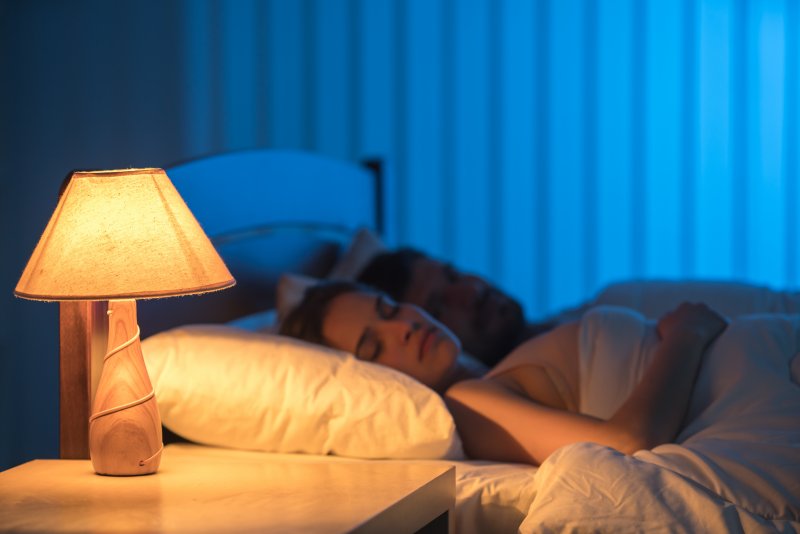
Many Americans fall asleep with their television on, their phone buzzing on the nightstand next to them, or with no curtains to cover the glow of streetlights outside their windows. A new study published by the Proceedings of the National Academy of Sciences (PNAS) suggests that even a moderate amount of light during sleep hours can have negative effects on someone’s cardiovascular and metabolic health.
Obstructive sleep apnea (OSA) is a sleep disorder that causes breathing to stop throughout the night, resulting in snoring, daytime sleepiness, and more. Related to light exposure at night, untreated sleep apnea has been found to have adverse effects on cardiovascular health as well, specifically heart disease. Together, these two factors can be fatal to one’s health.
The Research
In the PNAS study, 10 young adults participated in one night of sleep in a mostly dark room, followed by one night of sleep in a room with overhead lighting, just bright enough to be able to move around the room. Another group of 10 young adults spent two nights in a row in a mostly dark room.
Researchers found that the group that slept in a room with overhead lighting had higher heart rates throughout the night and increased insulin resistance in the morning. Increased insulin resistance makes it more difficult to get blood sugar back to a normal range.
The study suggests that a small amount of light is enough to impact the autonomic nervous system, which is the part of the brain that controls the body’s fight or flight response. During sleep, this should quiet down, allowing the heart rate to decrease.
Additionally, this research found that disruptions in circadian rhythms (the body’s natural sleep-wake cycle) can make it harder to regulate blood glucose levels, which can increase the risk of chronic illnesses like diabetes and other cardiometabolic problems.
Relationship Between Research Findings and Sleep Apnea
Chronic illnesses like diabetes and cardiometabolic problems are often linked to sleep apnea. Sleep apnea patients are 2-4 times more likely to develop heart arrhythmias than those without it. Additionally, obstructive sleep apnea has been linked to type 2 diabetes. Data has shown that those with type 2 diabetes are 71% more likely to have sleep apnea than those without diabetes.
Tips for Decreasing Light Exposure at Night
Light, natural or artificial, surrounds us at all times no matter the hour, but there are a few simple things you can do to make sure your bedroom is as dark as possible while you sleep:
- Blackout curtains: Window curtains and shades can block intrusive light from outside, making it easier to fall and stay asleep.
- Eye mask: Wearing an eye mask at night can create a personal zone of darkness, especially if a partner is a late-night reader.
- Monitor digital devices: Remove digital devices from the bedroom or set them on “do not disturb” or “airplane mode” to prevent blue light and buzzing from interrupting your sleep throughout the night.
- Set screen time limits: Turn off the TV and log off of social media an hour before going to bed to reduce nighttime blue light exposure.
If getting up in the middle of the night is necessary for any reason, use the minimum amount of light needed to move around safely. Avoid turning on all of the lights, as even this brief exposure can make it more difficult to fall back asleep.
How We Can Help
It’s important to make adjustments to decrease the amount of light we’re exposed to at night, as it is a risk factor for overall heart and metabolic health.
If making these changes isn’t improving your sleep health and you’re experiencing symptoms of sleep apnea like snoring, daytime sleepiness, or morning headaches, it may be time to have a sleep apnea screening.
If you live in the Atlanta area, Dr. Jeff Rodgers is here to help. He is a sleep medicine practitioner with over 20 years of experience successfully treating sleep apnea patients using customized oral appliances. Request an appointment today to learn more about treating obstructive sleep apnea.
